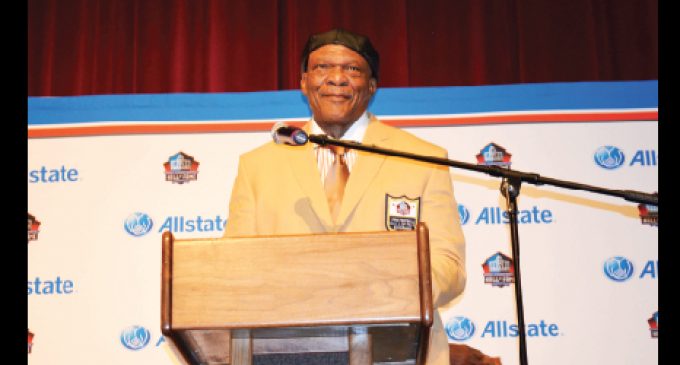Q & A with hometown legend

Carl Eller’s life as a legendary football player is well-documented, and he’s enshrined in nearly everybody’s Hall of Fame (college and pro). Recently, the man they call “Moose,” came home to Winston-Salem to receive the Hometown Hall of Famers Award, a national program that honors the hometown roots of football’s greatest coaches, players and contributors. He was honored in ceremonies held at Atkins High School. Eller was a stand out at the original Atkins High in the late 1950s.
During his playing days, Eller was a defensive end on the Minnesota Vikings famed “Purple People Eaters” defense. No doubt, Eller has countless memories of the skull-busting hits, fumble recoveries and quarterback sacks he had during a 15-year career that ended in 1979.
Today, the 71-year old Eller is president of the NFL Retired Players Association, where his primary focus is helping retired pro football players improve their quality of life.
Q: What does it mean to come back home – where it all started – for this occasion?
A: It means a lot. It’s been a lot of years (since I played). To come back and be welcomed and honored at my roots says a lot about the kind of life I’ve lived. To me, that’s very rewarding.
Q: What’s your impression of the new Atkins?
A: It’s a phenomenal school. I’ve been here a couple of times, but I haven’t seen all of it yet. I’m really pleased with what I’ve seen.
Q: What’s your take on the rules changes in the NFL?
A: They’ve taken a lot of the defensive weapons away and added them to the offense. That’s how you get more scoring and excitement. But the basic direction is to make the game safer. I’m hoping they don’t tamper with it too much. I like the game the way it was played when I played. We’ll have to wait and see what (further) adjustments they make.
Q: What are some of the more pressing issues for the NFL’s Retired Players Association?
A: We took care of some of those problems with the last collective bargaining agreement. That is (retired players) having more benefits and better access to health care. My goal right now is to really emphasize the retired player in the community. There (are) a lot (of) guys who are out of the game living in these communities all over the nation and they are assets to our community. Their experience from professional football is very valuable. So, I’m trying to bridge that gap with player and community so that both can benefit.
Q: We know about you because of football. What about Carl Eller the person?
A: I want to put emphasis on those things I’ve done after I played. Some of those things are significant. I started the substance abuse program in the NFL in which players could get help if they had problems. My program allowed them to get the help they needed and continue their careers. That’s one thing that I’m really proud of. The other is what I’m working on now to create an awareness of the value of the retired pro football player.
Q: Much has been written and said about the tragic deaths of former NFL players Junior Seau and Dave Duerson. There’s an overwhelming sentiment that both had serious medical problems as a result of playing football. Are those isolated cases, or is it more common than we’ve been led to believe?
A: There have been a few incidents, but we don’t know if we’re on the tip of the iceberg or what, or if there really are a few isolated cases. Of course, we’re looking at that now (brain injuries and concussions). But the fact is, we just don’t have that experience as to what those (medical) problems are.
Q: What do you think should be done to help retired players make a successful transition to life after football?
A: The experience of being an NFL player is such a high and it’s such an emotional experience. When you leave, I think that there are some psychologicaland emotional adjustments that players have to adhere to. I don’t think that we’ve discussed that aspect of the game. That’s why I focus a lot of my work on preparing these (soon-to-be-retired) guys for that psychological, emotional cliff, so that they can bridge that gap. Life doesn’t end when you’re done with the NFL. That’s what I’m trying to teach and preach.
Q: How do you want to be remembered?
A: As a guy who came from Winston-Salem and made it, had an exciting career in football, and also contributed to the game and to society in ways that go beyond the football field.
















